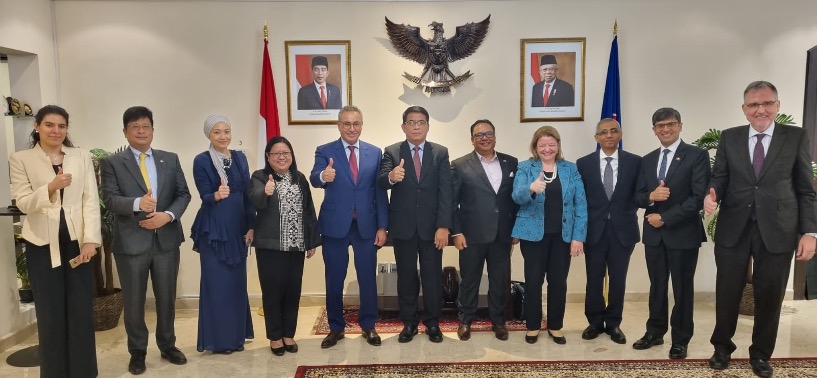
IPI MENA Policy Analyst Dalya Al Alawi, Thailand Ambassador, Charge D’Affaires of Brunei Darussalam, Philippine Ambassador, IPI MENA Senior Director Nejib Friji, Indonesian Ambassador, Malaysian Ambassador, Turkish Ambassador, Egyptian Ambassador, Nepalese Ambassador and Moroccan Ambassador to Bahrain
ASEAN and Arab diplomats called on greater regional integration and cooperation in the Middle East and North Africa (MENA) and greater collaboration and partnerships with ASEAN member countries based on mutual goals of peace and sustainable development.
On June 19th, IPI MENA Senior Director Nejib Friji was invited as a Guest of Honor to an ASEAN Committee Manama-Bahrain (ACMB) session, hosted by ASEAN Chair, Indonesia, which convened ASEAN Ambassadors residing in Bahrain: Malaysia, the Philippines, Brunei Darussalam and Thailand and non-ASEAN diplomats, including the Ambassadors of Morocco, Egypt, and Turkey.
Opening the session, H.E Ardi Hermawan, Ambassador of the Republic of Indonesia to the Kingdom of Bahrain, noted the strong partnership between IPI and Indonesia, particularly in the fields of peacekeeping, and underlined the importance of building on IPI MENA-MIKTA collaborations.
Highlighting the recent developments and current affairs in the MENA region, Mr. Friji pointed to the giga-investment projects, elevated energy prices, greater fiscal responsibility, and improving demographics as drivers aiding in a resurgence in growth in the region.
“The MENA region’s digital economy is predicted to hit a $400 billion mark by 2030 from the estimated $91 billion in 2021,” he noted. “The run-up to the $400 billion mark is also forecast to see major structural changes in the region’s digital economy, with sectors such as edtech and healthtech emerging as top performers.”
Pointing to the significant role of artificial intelligence (AI) in the region, he emphasized that the Middle East is expected to accrue 2 percent of the total global benefits of AI in 2030; the equivalent of US$320 billion. “In absolute terms, the largest gains are expected to accrue in Saudi Arabia where AI is expected to contribute over US$135.2 billion in 2030 to the economy, equivalent to 12.4 percent of the GDP. In relative terms the UAE is expected to see the largest impact of close to 14 percent of the 2030 GDP,” he stated.
He stressed the importance for the region to be strategically placed to provide a springboard for the future, beyond 2030, as the scope of AI impacts on both the economy and society will almost certainly increase.
In ensuring a stable and secure future, he also underlined the youth bubble prevalent in the region, and noted that prior to the onset of the COVID-19 pandemic, 30 percent of young people in MENA aged 15–24 were neither employed, in school, nor receiving training.
“Ensuring the private sector can gain access to markets and compete equally with government-run businesses is vital for countries across the MENA region to create jobs in a region with the highest youth unemployment in the world.”
Turning to the Russian-Ukraine conflict, he pointed to food security in the region and the exacerbation of the year-on-year food inflation for nearly all countries in the MENA region. “The MENA region is the region most impacted by the current food crisis,” he stated. “According to the IMF, 141 million people across the Arab world were exposed to food insecurity in October 2022.”
Mr. Friji did emphasize, however, the positive developments in light of recent events, pointing to the rapprochements between various conflicting parties, specifically the Gulf Cooperation Council (GCC) with Qatar, the official diplomatic ties between Saudi Arabia and Iran, and the subsequent alleviation of the Saudi-Yemen conflict.
“There are also numerous opportunities presenting itself in the pipelines, for example between China and the GCC. There was the first-ever China-GCC meeting in Riyadh in December 2022,” he stated. “We are clearly seeing a shift from the traditional players or security guarantors in the region, such as the US, Britain, or the EU as the GCC diversifies its partnerships.”
He concluded by pointing to the various opportunities for ASEAN countries in collaborating, investing and partnering in the development progress in the MENA towards building a peaceful, resilient and sustainable region.







